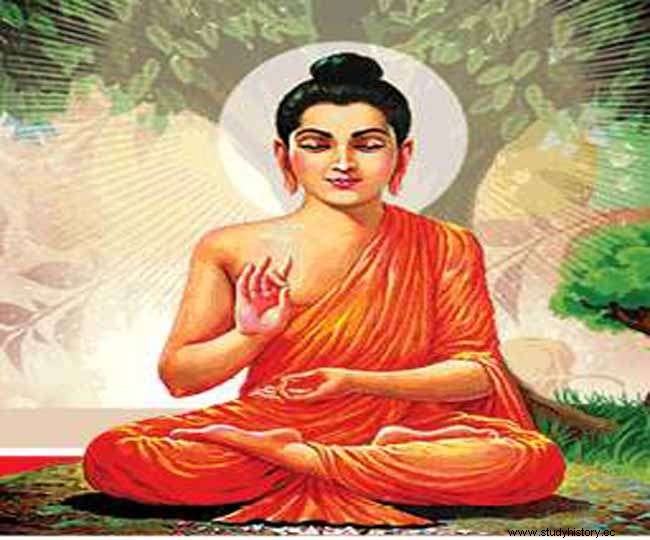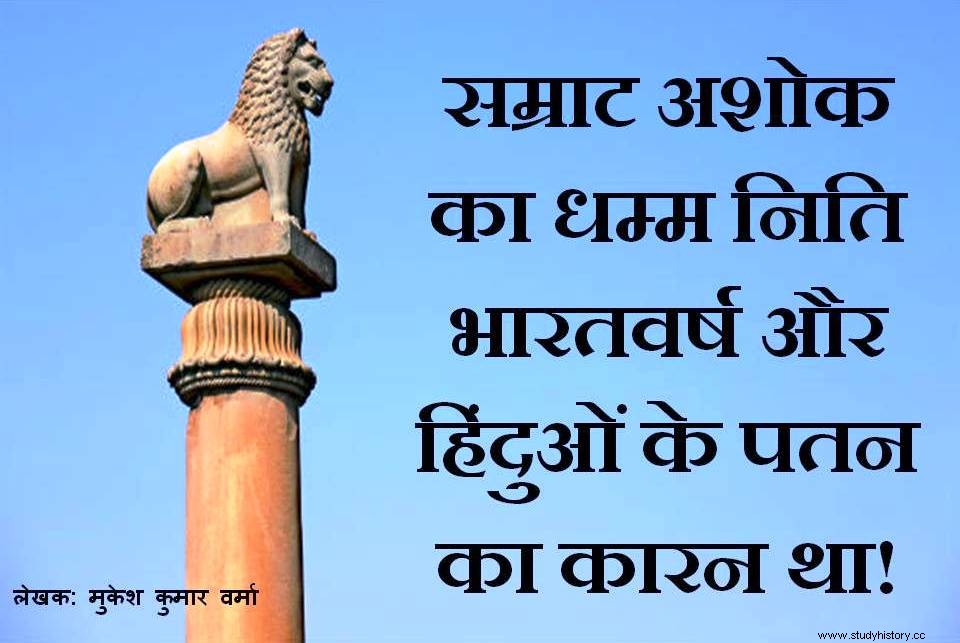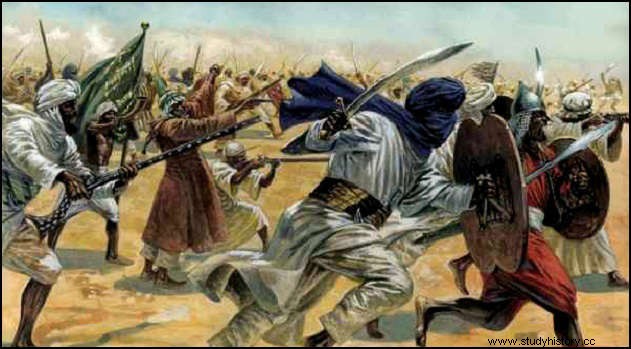Namo Buddha
Famous journalist and writer François Gautier, through his article Hindu Power, has tried to explain that the reasons for the decline of Bharatvarsha/Hindus are the evils like cowardice, passivity, hyper-tolerance and submissiveness in Hindus and these evils are more or less Buddhist among Hindus. Due to the wrong policies of non-violence of religion and its widespread influence in India, it has spread in the public mind. For example, they say that Hindus / Buddhists still lurk in homes away from legitimate fights, from Kashmir. Four lakh Pandits are forcibly fired because of violence just because they are Hindus and they silently become refugees in their own country without firing a single bullet. Millions of Hindus/Buddhists perish without protest in Pakistan and Bangladesh and even today in West Bengal where Muslims are growing, Hindus are quietly leaving the city due to terror.
They say that even if anyone has picked up a weapon in similar circumstances in Assam, he is a Christian (Bodo). Referring to the events of the past, it is said that when the Muslims occupied Afghanistan, they killed lakhs of Hindus/Buddhists and that is why even today that area is called Hindu Kush. Mohammad Ghori enslaved 5 lakh Hindus/Buddhists and took them to his country. Not even his soldiers were so much. Timur killed one hundred thousand Hindus/Buddhists together in one day in Delhi. If they had attacked Timur's army together, Timur would have been forced to run away.
Was Buddhism really the reason for the downfall of Hindus and Bharatvarsha

Being a student of history, I agree with all the figures given by him and believe that not only in Afghanistan but also in Arabia to Pakistan, Kashmir including India and Bangladesh, Muslims were killed or forcibly converted to Islam and their This cowardly non-violent tendencies had caused great harm to the Hindus as well. But I have a slight difference of opinion with them. In my view the cowardice, inaction, hypertolerance and submissiveness of Hindus and Buddhists responsible for the downfall of Hindus and Bharatvarsha are not due to the religion of Mahatma Buddha but because of the Dhamma policy of Emperor Ashoka.
Mahatma Buddha expressed non-violence as a human sentiment and not as a policy of the individual or the state. His meeting and dialogue with the Angulimal dacoit is a testimony to the fact that non-violence does not mean cowardice at all. Not only this, Magadha emperor Bimbisara, Ajatashatru, Kosala king Prasenjit etc., who had patronized Buddhahood, never established non-violence as the policy of the state. Azadshatru fought many battles despite being a follower of Buddhism. He conquered Vajjisangh, Anga, Kosala by force but Buddha never opposed it. Then in 483 AD he also organized the first Buddhist council.
Mahatma Buddha himself was born in the Shakya Kshatriya clan, a branch of the glorious Lichchhavis, a descendant of Lakshman, the son of Shri Ram, the Ichchvaku dynasty. Kshatriyas have been described as the best in Buddhist texts and they have been glorified. Kshatriya was synonymous with valor, valor and war, not cowardice, passivity and submissiveness.
Mahatma Gandhi had also experienced that, "There is no doubt in my mind that in the majority of quarrels the Hindus come out second best. But my own experience confirms the opinion that the Mussalman is a bully, and the Hindu is a cowward. Need the Hindu blame the Mussalman for his cowardice? Where there are cowards, there will always be bullies.”
He further said that “My non-violence does not admit of running away from danger and leaving dear ones unprotected. Between violence and cowardly flight, I can only prefer violence to cowardice." Hindu-Muslim Tension:Its Cause and Cure, Young India, 29/5/1924; Reproduced in M.K. Gandhi:The Hindu-Muslim Unity, p.35-36.
Truly, I have no right to cry if we are victims of violence because of our cowardice. Who has stopped us from becoming domineering, mighty, combative and violent? If we are oppressed because of our cowardice, impotence and inaction, then we cannot blame anyone else for that. We have to fight and fight ourselves.
The question is, after all, why are we, mighty, courageous and Yuyutsu Veerputra Hindus, who once ruled almost the whole of Asia and South-East Asia, have become cowardly and submissive today? Why are we brave sons of Hindus today compelled to run away from everywhere after being robbed or to embrace death? The answer to these questions is in Ashoka's policy of Dhamma.
Ashoka's Dhamma policy that made non-violence cowardly

Emperor Ashoka became disengaged from the war after his violent strategy and the horrific orgy of violence in the Kalinga War. After the war with Kalinga and the horrific massacre just to satisfy his ego and imperialism unnecessarily, Ashoka's behavior when he opened his eyes was like drinking even burnt buttermilk of milk. . Burning in the flames of repentance for his misdeeds, he blunted the power of political power by forgetting the basic mantra of governance, price, punishment and discrimination. To satisfy his heart troubled by unnecessary violence, he forgot the Sanatan Parampara Ahimsa Paramodharmaah Dharmaviolence and started chanting only Ahimsa Paramodharmaah and unfortunately this became the basic mantra of his strategic policy. As a result, there was rust in the weapons and the arms of the soldiers became powerless. As a result, the roots of the power of the great Maurya Empire, which had been acquired by the sword, began to weaken. In the latter part of his rule, many satraps rebelled and started behaving like independent rulers. As long as Ashoka was alive, his power was somehow maintained in the midst of opposition, but within only 40-45 years of Ashoka's death, the great Maurya Empire and power fell like a deck of cards, for which Ashoka was not responsible for his weak successors. Must be considered.
In fact, the Dhamma victory established by Ashoka in the entire Jambudvipa was neither based on Sanatan Dharma nor on Buddhism. It was based only on the repentant self-blame of a violent ruler. Mahatma Buddha stayed away from rule and power for life. He had paved the way for social system change, destruction of suffering and nirvana, had propounded the policy of peace and non-violence for the individual, did not propound the policy of non-violence and disarmament for the government. In other words, he had not tampered with the eternal policy of non-violence paramodharma:religion-violence and c.
But Dhamma-politics and its propagation derived from the repentance of the culmination of violence of Emperor Ashoka was the reason for the decline of Bharatvarsha and Hindus, which again kept the unity and integrity of India fragmented. This was the period when Sanatan Hindus began to deviate from their original culture, civilization, tradition, valor, bravery and knowledge. From the point of view of the security of Hindus and Hindustan, forgetting religion and violence, they started memorizing only half incomplete sentences of non-violence paramodharma, and from this the decline of Hindus started.
Historian PN Oak writes, "The people of the great Vedic Aryan culture (Hindu, Buddhist) of Eurasia were getting absorbed in the culture of "Violence loot paramodharma:" while chanting the silly garland of "Ahimsa Paramodharma."
result of Ashoka's foolish Dhamma policy
When the Mauryan Empire, which extended to Afghanistan, Pakistan, India, Bangladesh and South-East Asia, began to disintegrate in 240–232 AD due to Ashoka's foolish Dhamma policy, it was natural to create discontent among the people against authority and Dhamma. After the death of Ashoka, when the great Mauryan Empire broke up and disintegrated within a few years, there was anger among the people against the authority and Dhamma, in response to which the orthodox Hindutva Sunga dynasty emerged. The central vacuum that arose after the fall of the Maurya Empire due to the failure of Dhamma-politics, was due to the Indian satraps who were ruling in Iran (Parthians, Pahlava), Central Asia (Scythians, Sakas), Far North (Yuchi, Kushan) etc. There was local pressure on them and they were forced to flee to their center India, who competed on the border with the independent satraps from the Maurya Empire and were weakened by fighting among themselves.
The Bharatvarsha which the great Chanakya and Chandragupta had laid the foundation of a powerful power and rule by tying them together with their blood and sweat, was scattered again and again due to the foolish Dhamma policy of Ashoka. Not only did it cause political damage, the more lethal result was that Hindus became cowards, then Buddhists became cowards, then other Hindus also forgetting their valor and bravery, first fools became non-violent and drowned in luxury, then became cowardly and impotent and succumbed to Christianity and Islamic violence. .
Ashoka's foolish non-violent policies had not only ruined the security system of the state, but his long inactive rule had made the public mind inactive. The inaction of the public mind gradually turned into cowardice and submissiveness, which people started wearing the words of non-violence, humanity etc. The Kshatriyatva had come to an end during the reign of Ashoka. Due to Ashoka's policy of non-violence, scholars forgot their history and basic duty by adopting Vaishya Varna (profession) to remove most Kshatriya unemployment. On the other hand, the Buddhists who were eating cream under Ashoka's rule started being neglected in India since his death. Under the rule of Shungas, they were completely neglected, suffering from anti-Hindu mentality, they were cut off from the Hindus.
The mighty Pushyamitra Shunga succeeded in reuniting the disintegrated Maurya Empire to a great extent, but the foolish and cowardly Dhamma policy of Ashoka and his successors had made a deep impact on the Hindu and Buddhist masses. The Hindus tried to get rid of it and succeeded but the Buddhists did not want to be free from it, but struggled with the power for its recovery and for their political return, they cooperated with the enemies of the state and even foreigners. Started taking and giving. Perhaps this is the reason why the Gaur king Shashanka had expressed his anger towards Buddhism by uprooting the Bodhi tree.
Impact of Dhamma Policy outside India

It was more or less the same situation outside India as well. Wherever Ashoka's Dhamma reached, the bravery and brilliance of the mighty Hindus ruling the whole of Eurasia weakened. Perhaps the Hindu-Buddhist society, which was polluted by Ashoka's foolish Dhamma policy, was the reason for the birth of violent Christianity and Islam. This is the reason that after losing power in remote countries, they could not even withstand the invasions in the frontier areas. At first they were victims of the attack of the Huns, in which the Hindus resisted to some extent, but the Buddhists easily because of their faulty non-violence policies. were brutally murdered. Sindh was invaded during the Muslim period and trampled upon by Hindu/Buddhist Muslims who had become cowardly, passive and submissive. When the Muslims attacked Afghanistan, the country of Brahmins and Buddhists, the Brahmins fought to some extent, but other sections of the society, Buddhists etc., proved to be completely unsuccessful in this. Most of them were mercilessly slaughtered at the hands of the Muslims and the rest surrendered to them and became Muslims and became the helpers of the Muslims against their own country and religion, erasing the names of Hindus and Buddhists from Afghanistan.
From Arbasthan to Iraq, Samarkand, Afghanistan, Swat, Kafistan etc., there were about 40% Buddhist or Buddhist states, which were easily killed in the Islamic invasion or surrendered and became part of the invading mob. The result was that 60% of Hindus went backward in the struggle despite full force to oppose the Muslim invaders, the result of which is today the Muslim countries of Afghanistan, Pakistan, Bangladesh and Kashmir of India, from where Hindus and Buddhists have been almost eliminated. There is evidence from history that in the rest of India also, the wise became the easiest victims of the Muslims. After this Dalit Hindu and others can be kept. They were either killed or converted to Islam after the Muslims destroyed the Pala dynasty, the last patron of the Buddhists. This is the reason why Buddhists were almost finished even from their native country India.
What to do now
Today it has become necessary for the Hindus to try to get rid of their cowardice, passivity and submissiveness to protect their existence and their native land, otherwise the way India is bound to become Afghanistan, Pakistan, Bangladesh, Kashmir, that process May continue further and Hindus may once again have to face painful violence, loot and rape of their loved ones. War policy says that when one side is weak, only then the possibility of war increases. If you want peace, then preparation for war is necessary. If Hindus are to survive the horrific violence, then renouncing cowardice and passivity, they will have to work hard to become armed with weapons and become courageous and mighty. Along with mobile and TV in every house, weapons will also have to be kept in every house and they will have to be practiced.
